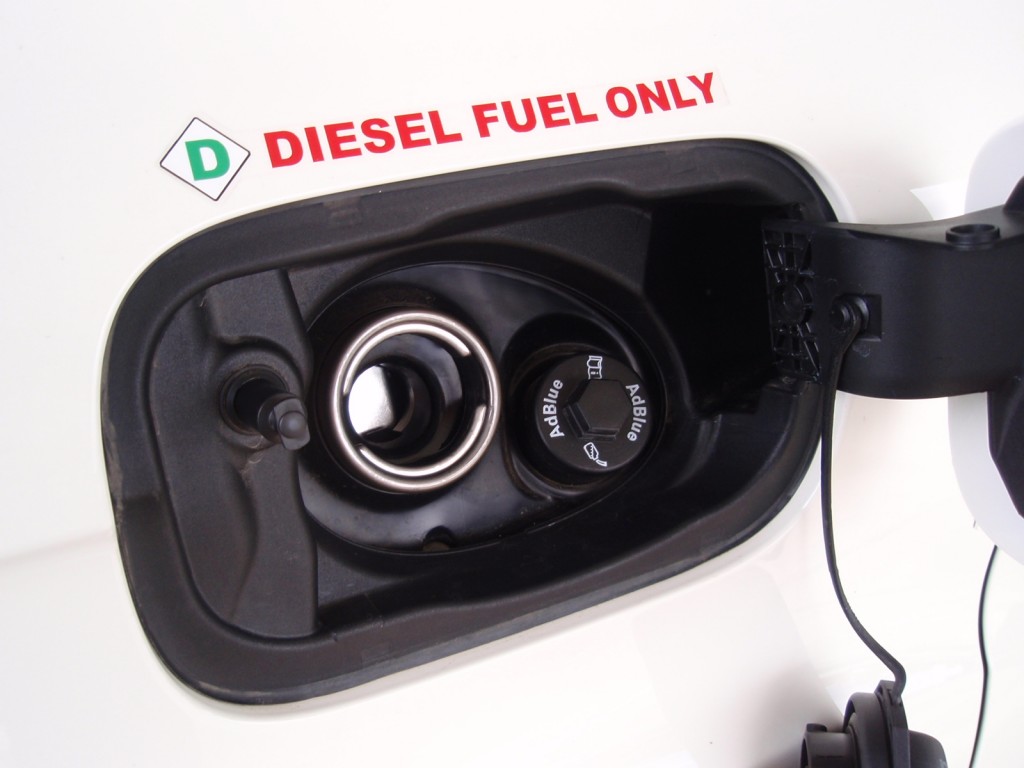As gas-mileage standards tighten steadily through 2025, how do you have a big, powerful, luxurious sedan more efficient?
The Tesla Model S shows one way--make it all-electric--but other makers are taking other routes.
Audi, perhaps more than any other German luxury make, says the answer is diesel engines.
It's long sold its low-volume A3 compact hatchback and Q7 large sport-utility vehicle with TDI diesel engines as an option. One third to more than half of customers order them, depending on the model.
From two to six TDIs
But this year, as part of a wave of new diesel cars for 2014, Audi has added diesel options to four more models: its A6 mid-size sedan, A7 "four-door coupe," A8 full-size luxury sedan, and Q5 compact crossover utility vehicle.
All four vehicles in their TDI form are fitted with a 3.0-liter V-6 turbodiesel, which puts out 240 horsepower and a substantial 406 pounds-feet of torque. Urea aftertreatment to reduce emissions is standard.

'Diesel fuel only' caution on Audi Q7 TDI
The older A3 TDI uses the same 2.0-liter turbodiesel as the Volkswagen Jetta TDI and Golf TDI models, though that will be replaced in the all-new 2015 A3 with a new, more efficient four-cylinder diesel from the VW Group lineup.
Scott Keogh, CEO of Audi of America, told attendees at last week's Management Briefing Seminars in Traverse City, Michigan, that "diesel is absolutely getting ready for the marketplace."
As quoted in Ward's, Keogh suggested that "far more universal adoption" of the latest diesel engines was on the horizon--and that Audi was "waiting" for customers to catch on.
And while the article reports that Keogh had "little to contribute to his panel’s discussion on sustainability," the Audi chief stressed the company's longstanding experience in winning races--specially the 24 Hours of Le Mans--with high-performance diesel cars.
Highest on highway
Diesels return their best fuel-economy numbers in high-speed highway use, but have slightly less of an advantage in stop-and-go city and suburban use.
That's why many makers quote EPA highway ratings when contrasting optional diesel engines to the gasoline alternatives.
The Audi A6 TDI quattro, for example, is rated at 38 mpg highway--compared to 27 mpg highway for the gasoline A6 with an equivalent supercharged 3.0-liter V-6.
Their city ratings are 24 mpg (diesel) and 18 mpg (gasoline) respectively, and the combined ratings are 29 mpg and 22 mpg.
Diesels often deliver better fuel efficiency than their EPA ratings, unlike some gasoline and hybrid cars.
One model for all markets
So diesels are clearly an easy way for carmakers to get a substantial boost in EPA ratings.
And Audi, like many German makers, is faced with the advent of Euro 6 emissions regulations in its home market--they're roughly equivalent to current U.S. limits.

2013 Audi Q5 TDI
That means it can engineer its future diesel cars to a single standard, eliminating the cost of low-volume U.S. diesel models that must meet more stringent standards than the old Euro 5 limits.
At the low end of the market, those new limits are eliminating some of the smallest diesels. Volkswagen has already said it won't make any future diesels below 1.6 liters, for instance.
More diesels in large cars?
So for the smallest cars, it'll be gasoline engines that are smaller, often turbocharged, and more efficient.
That means you're likely to see more diesels in high-end luxury cars.
Five years ago, would you have expected Porsche to offer U.S. buyers a diesel option on its pricey, high-performance Cayenne sport-utility vehicle?
Still, the degree to which luxury buyers will warm to diesels remains an open question.
How well do you think diesels stack up against hybrids, and even all-electric sport sedans like the Tesla Model S, in the expensive luxury sector?
Leave us your thoughts in the Comments below.
_______________________________________________













